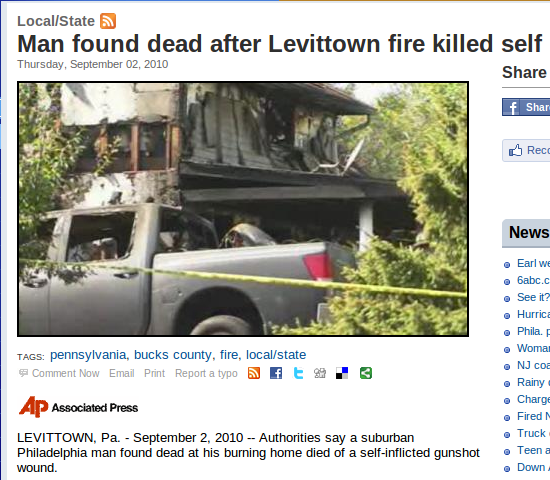Decapitated Democracy, Headless Liberty
A couple of days ago, and within minutes of each other, David Moser and Brendan O'Kane called my attention to the latest graphemic pun going around the "Nèi liánwǎng 内联网" (what some netizens call the firewalled Chinese Internet, and what we might translate as "Intranet") is to refer to the 目田 and 氏王 enjoyed by Chinese citizens.
Read the rest of this entry »
Check it out
John McWhorter on Talk of the Nation, "DEA Call For Ebonics Experts Smart Move", 9/6/2010. (Download mp3 here.)
A Bus to Don't Know
Dan Bloom just sent me this photograph that is making news in Taiwan:

Riders are advised against taking bus no. 1203, because the authorities don't know where you might end up if you do.
Read the rest of this entry »
Coit Tower attacks a catalyst
Geoff Nunberg sent around a link to C.W. Nevius, "Coit Tower attacks a catalyst for park crackdown", San Francisco Chronicle 9/4/2010. The Landmark's Revenge?
Read the rest of this entry »
Underlooked
The background: in 2009, the Bishop Miege high school football team had a 12-0 record and won the state championship in the 4A division. This year, they moved up to the 5A division. And according to Candace Buckner, "Bishop Miege’s step up into 5A not a hard one in opener", Kansas City Star, 9/4/2010:
[senior lineman Shane] Ray said, “Every article I read, it’s more so like ‘Miege is moving up to 5A, will they be able to compete against these other teams? And I don’t really like that. As a team, we don’t like that feeling of being underlooked because we did win a state title. Not any team can just win a state championship, otherwise everyone will have one.”
I mean, if you can overlook things, why shouldn't you be able to underlook something? (By not looking high enough, naturally.)
Read the rest of this entry »
Are "heavy media multitaskers" really heavy media multitaskers?
A few days ago, I asked for help in tracking down some of the scientific support for Matt Richtel's claims about the bad effects of "digital overload" ("More factoid tracking", 9/1/2009). One of the more trackable factoids was the "study conducted at Stanford University, which showed that heavy multimedia users have trouble filtering out irrelevant information — and trouble focusing on tasks". And sure enough, The Neurocritic quickly came up with a reference that fits: Eyal Ophir, Clifford Nass, and Anthony Wagner, "Cognitive control in media multitaskers", PNAS, Published online before print 8/24/2009.
I believe that the full paper is freely available at the link given above (please let me know if this is wrong), and if you're interested in this topic, I urge you to read it. As in the case of the last paper by a Stanford psychologist that was discussed here, you should start by asking "Never mind the conclusions, what's the evidence?". And again, you may conclude that the descriptions of this research — in the popular press and even in the original paper — lead readers pretty far beyond the interpretations warranted by the research itself.
Read the rest of this entry »
The babbling phase: ranting toddler speaks out
When the stresses and strains of university department administration get me down, when I need a break and I really want to giggle till I'm helpless, I simply close my office door, bring a box of Kleenex over to near the computer so I can wipe off the tears running down my cheeks, and watch, once again, the Facebook ranting toddler video. Victor Mair first brought it to our attention here at One Language Log Plaza, and we have been watching it occasionally ever since. The extraordinary intensity of this little girl's concentration on the nonsense she is babbling, together with the strange fantasy of the wandering themes in the subtitles, yields an experience the like of which I have never seen anywhere.
Read the rest of this entry »
It is forbidden to urinate here. The penalty is bang.
Despite the best efforts of two dozen stellar native and non-native scholars and teachers of Chinese, we still have not reached a consensus about the exact meaning and syntax of the sign at a Shanghai construction site presented in "Next Day's Chinese lesson": Jìnzhǐ xiǎobiàn, fǒuzé sǐrén 禁止小便,否則死人 ("prohibit urine, otherwise die person").
Such is not the case with the sign in this photograph, taken a few years ago in Bohol in the central Philippines. The photographer was Piers Kelly, editor of Fully (sic), and the language is Visayan (also called Cebuano).
Transcription: Guinadili ang pag-pangihi dinhi. Ang silot [bang!]
Read the rest of this entry »
The Wall Street Journal Is Probably Not Red-Faced
Last summer, I posted on an ad in the New Yorker sponsored by the Massachusetts Office of Travel & Tourism in which a string of Chinese characters was inverted mirror-fashion: "Masschusetts is red(-faced)", 6/5/2009.
When I saw this photograph in the Wall Street Journal, I immediately did a double-take and thought that I had caught the WSJ committing the same error (Paul Mozur, "Taiwan and China work on their thesaurus", 8/31/2009):

Read the rest of this entry »
"And the town takes to dreaming"
At some point, I mean to get back to looking up the research that is said to support Matt Richtel's claims that "the brain is rewired when it is constantly inundated with new information". Right now, though, I'd like to point out that complaints about the distractions of modern life didn't begin when email, texting and hyperlinks started eating our brains. I wouldn't be surprised to find similar sort of complaints from the 13th century about clock towers, but today I'm just going to take things back to 1924, and an article from the New York Times with the headline "This Machine-Made World Conquers One More Rebel".
Read the rest of this entry »


